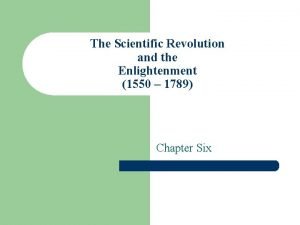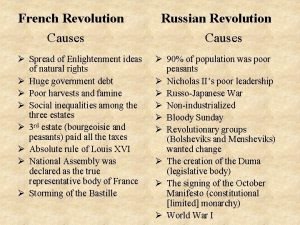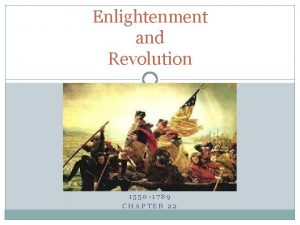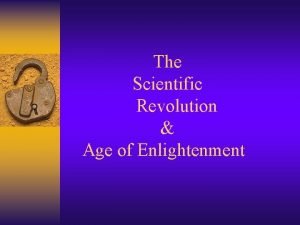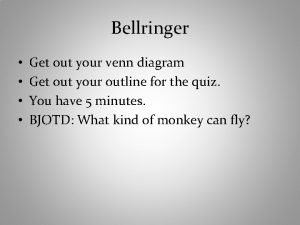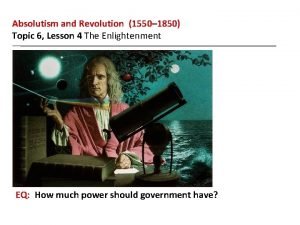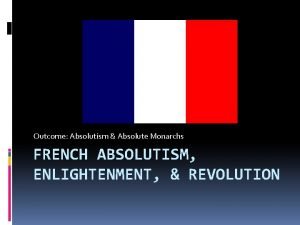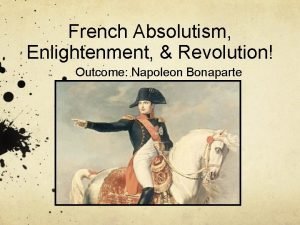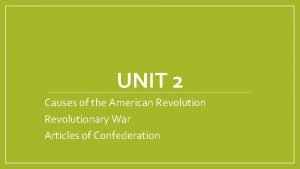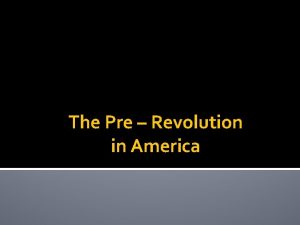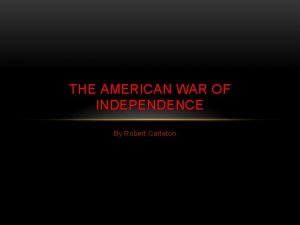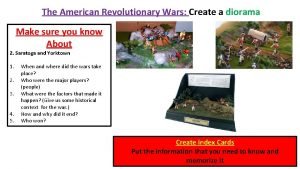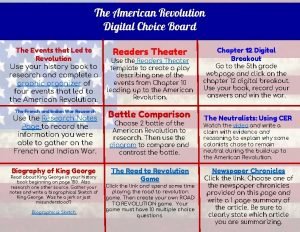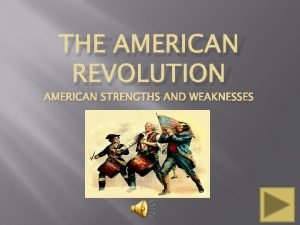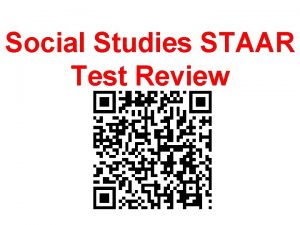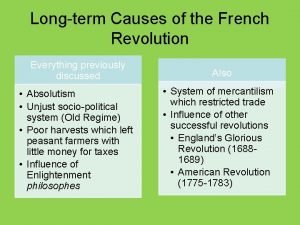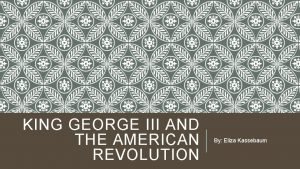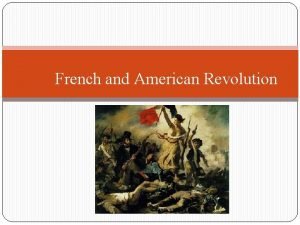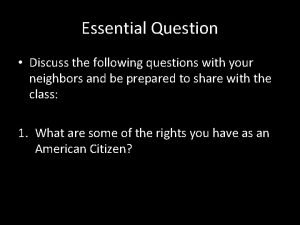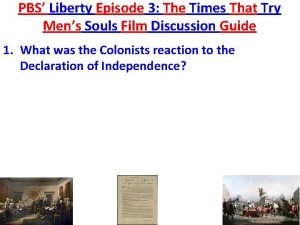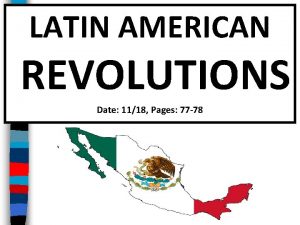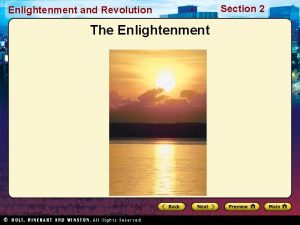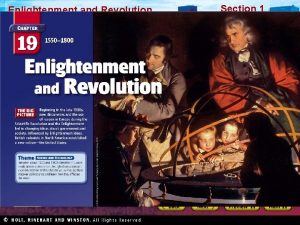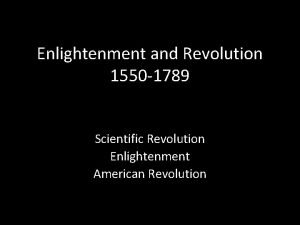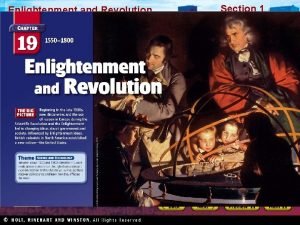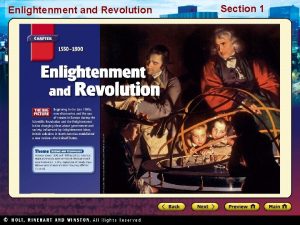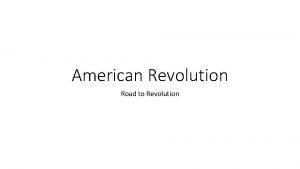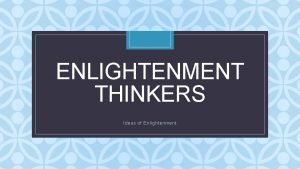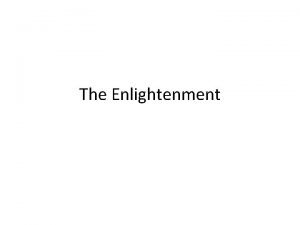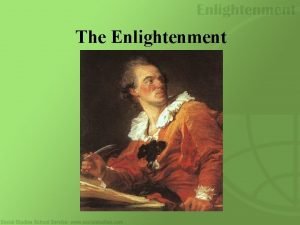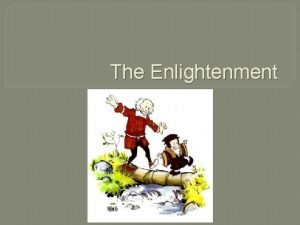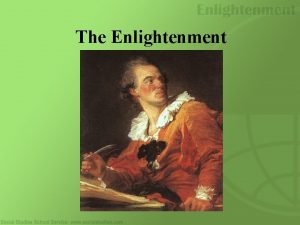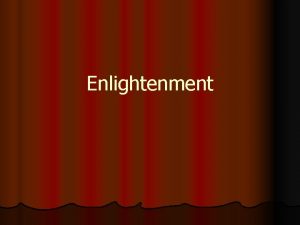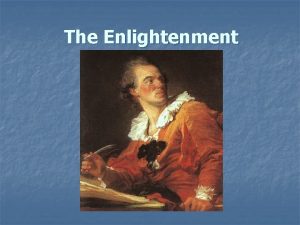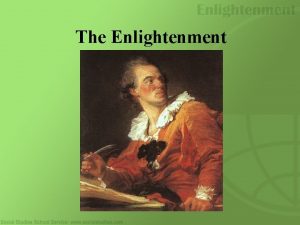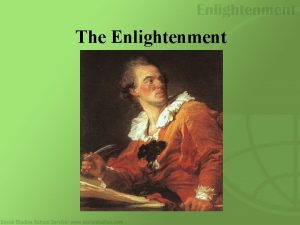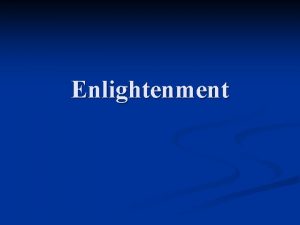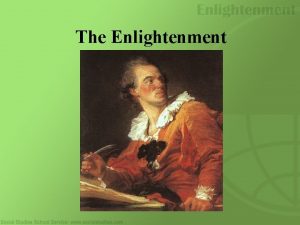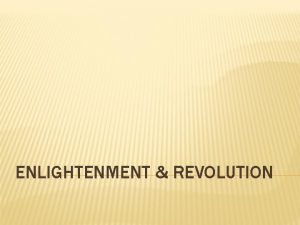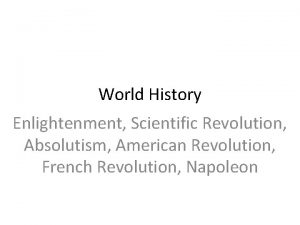Unit 4 Enlightenment Revolution The Enlightenment American Revolution


























- Slides: 26

Unit 4: Enlightenment & Revolution The Enlightenment & American Revolution

UNIT 4: ENLIGHTENMENT &A. REV The Enlightenment

WHAT WAS IT? Philosophical mvmt / focused on reason Using scientific meth in all areas of study Natural law - rules of conduct through reason chelp explain aspects of humanity � Better understand society, politics, & econ

FATHERS OF THE ENLIGHTENMENT Thomas Hobbes Wrote Leviathan – said ppl are naturally cruel, greedy, & selfish � Need control � Ppl should enter into social contract – agreement to give up freedom for organized society � Believed in powerful govt – absolute monarch

FATHERS OF THE ENLIGHTENMENT John Locke � Ppl = decent & had natural rights – for all humans from birth (life, liberty, property) govts to protect these rights � Best govt was limited & liked by all ppl have right to take out govt if it fails/violates ppl’s rights � Ppl molded by experiences � Environment shapes the person

THE PHILOSOPHES Enlight ideas big in 1700 s French Enlight thinkers used science to understand / fix society � Use of reason � Called philosophes

THINKERS OF THE ENLIGHTENMENT Montesquieu – studied govts � Wrote Spirit of the Laws in 1748 Govt best divided into 3 branches Separation of powers, checks & balances… � Ideas = big influence on US Constitution

THINKERS OF THE ENLIGHTENMENT Voltaire: criticized Christianity; focus on tolerance & inequality; fought for freedom of speech � “I might disagree with your opinion, but I am willing to give my life for your right to express it. ” Diderot: wrote Encyclopedia; set of 28 books that spread Enlight ideas

THINKERS OF THE ENLIGHTENMENT Rousseau: ppl naturally good / corrupted by evils of society � Wrote The Social Contract – freely elected govts should have control � Good of community was most imp Women � Had nat rights but limited to home/fam � Women begin protest – mid 1700 s Want equal ed & to make own decisions

NEW ECONOMIC THINKING French economic thinkers = physiocrats � Rational sys based on natural laws of economics � Rejected mercantilism (govt reg of economy) Supported free trade & opposed tariffs (tax on imports) Adam Smith – Scottish economist � Wrote The Wealth of Nations – wanted free market to reg bus activity � Invisible Hand Theory & Laissez Faire– little or no govt in bus laid back / hands off approach to economy Supply, demand, competition fix econ naturally

Unit 4: The Enlightenment & A. Revolution Spread of the Enlightenment

Ideas Challenge Society • • Heart of Enlight = Paris Upper class spread w/books Most wanted change & just society Censorship used to keep old ways – Fiction used as loop hole • Ideas spread in salons – Social gatherings – Put on by women

Arts/Lit Reflect New Ideas • Art style changed w/Enlight • Before = baroque – large, ornate, colorful, battles… - during time of Louis XIV • Rococo style dev – charming, lighter, elegant, flowers, pastels – Big w/ upper class

Arts/Lit Reflect New Ideas • New music – classical – Ballets & operas – Sebastian Bach – Mozart • New literature & bigger audience – Middle class – More novels

Enlightened Despots • Monarchs split btwn absolutism & enlight ways – Enlightened despots – abs rulers who brought change • Frederick the Great (Prussia, 1740 -1786) – Tight control/worked for common good – Reduce torture, free press, simplified laws, religious tolerance

Enlightened Despots • Catherine the Great (Russia; 1760 s) – Wanted equality & liberty – Abolish torture, est relig tolerance – Still had tight control • Maria Theresa (Austria) – Wanted better life for peasants • Joseph II (Austria) – most radical – Relig equality, no censorship, no serfdom

Slow Change • Peasant life didn’t change much – Very slow change • Many resisted enlightenment • Eventual transformation in 1800 s

Unit 4: Enlightenment & Amer Revolution The American Rev & Birth of the US

Britain Becomes Global Power • Controlled trade – mercantilism/great location • Won conflicts / control slave trade • Big territory – made United Kingdom of Great Brit (1707 / Ireland joined 1801) • George III – 1760 made king (60 yrs) – Controlled / restricted 13 colonies – In power at time of American Revolution

Colonist Discontent • F&I War put Brit in debt – George made colonists pay • taxes: – Sugar Act (1764): import taxes – Stamp Act (1765): taxes on printed materials • Colonists oppose/angry – “No taxation w/out representation” – Led to tension/restrictions/+ tax

Colonist Discontent • Boston Massacre – March 1770: fight btwn colonists & Brit soldiers – British shoot into crowd / parts still unknown – 5 colonists killed and called massacre by colonists • Boston Tea Party – col dump tea in Boston Harbor

Colonist Discontent • Col reps met in Philly to decide action – John Adams & George Washington there • Led to war: – Lexington & Concord was start of the Rev War – Washington led Continental Army (patriots)

Independence • 2 nd Continental Congress vote for independence – Thomas Jefferson: main writer of Declaration of In. – Used Locke’s views: “life, liberty, & property” • Popular sovereignty: govt of the people • July 4, 1776 – Declaration adopted – Still not “free”

The Rev Continues • 1/3 of colonists = loyalists (support Britain) • France help colonists after Battle of Saratoga in 1777 • 1781 – war ends at Yorktown, VA • Treaty of Paris ended the war

A New Constitution • 1 st govt = Articles of Confederation – Too weak; too much state control • Met in Philly again (1787) to fix prob – James Madison, Ben Franklin, G. Wash – Wrote the Constitution • Created federal republic w/ divided power (3 branches) – Separation of powers

A New Constitution • Ideas of Enlight in Constitution – Not everyone liked • Bill of Rights included before states would ratify/approve • Adopted in 1789
 Could the french revolution have been avoided
Could the french revolution have been avoided Newton's first law of motion
Newton's first law of motion Divine rights of kings
Divine rights of kings Enlightenment and french revolution
Enlightenment and french revolution Chapter 22 building vocabulary enlightenment and revolution
Chapter 22 building vocabulary enlightenment and revolution Scientific revolution and enlightenment speed dating
Scientific revolution and enlightenment speed dating Scientific revolution and enlightenment venn diagram
Scientific revolution and enlightenment venn diagram Absolutism and revolution lesson 4 the enlightenment
Absolutism and revolution lesson 4 the enlightenment French absolutism enlightenment & revolution
French absolutism enlightenment & revolution French absolutism enlightenment & revolution
French absolutism enlightenment & revolution Absolutism definition french revolution
Absolutism definition french revolution French absolutism enlightenment & revolution
French absolutism enlightenment & revolution Unit 10, unit 10 review tests, unit 10 general test
Unit 10, unit 10 review tests, unit 10 general test Causes of the american revolutionary war
Causes of the american revolutionary war Peter zenger american revolution
Peter zenger american revolution American revolution facts
American revolution facts Boston tea party diorama
Boston tea party diorama American revolution choice board
American revolution choice board Strengths of the continental army
Strengths of the continental army Wentworth cheswell
Wentworth cheswell Long term causes french revolution
Long term causes french revolution Who was the king during the american revolution
Who was the king during the american revolution American revolution effects
American revolution effects Discuss the following questions
Discuss the following questions The american revolution chapter 6 section 4
The american revolution chapter 6 section 4 Liberty the american revolution episode 3
Liberty the american revolution episode 3 Latin american revolutions date
Latin american revolutions date

